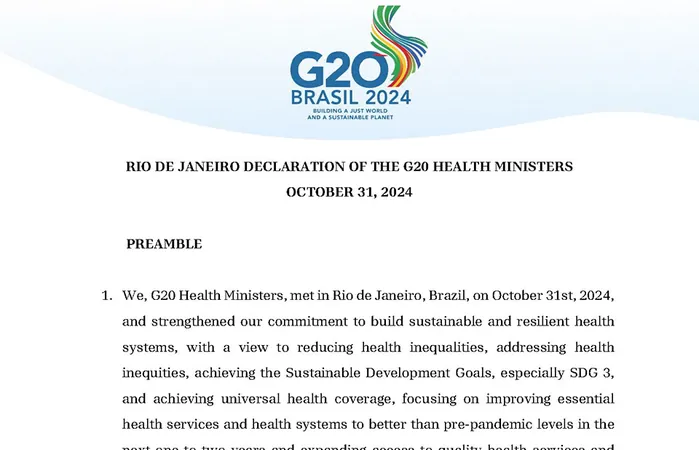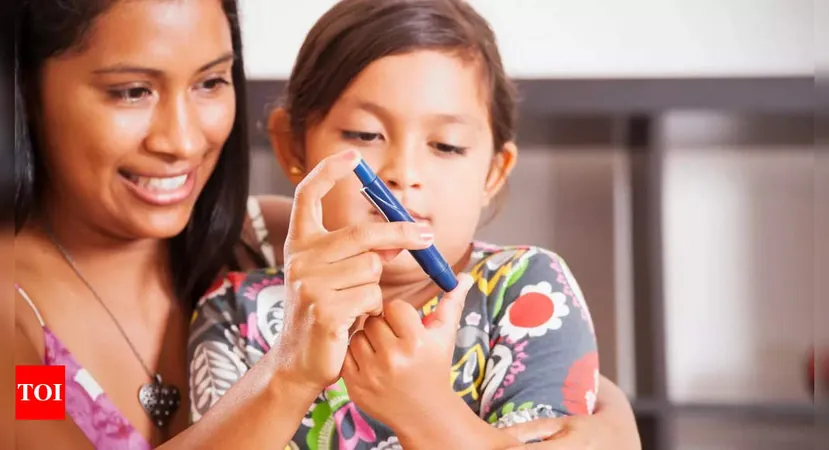
G20 Takes Historic Stand Against Inequalities Fueling AIDS and Pandemics with New Health Initiative!
2024-11-01
Author: Li
RIO DE JANEIRO, BRAZIL, 1 November 2024 — In a groundbreaking moment at the G20 Ministerial meeting in Rio de Janeiro, global leaders have unanimously agreed to intensify their efforts in combating AIDS and other pandemics by addressing the underlying inequalities that perpetuate these health crises both on a global and national scale.
International experts have hailed this commitment as a monumental breakthrough in the ongoing battle against AIDS and other health emergencies. Notable figures such as Nobel Prize-winning economist Joseph E. Stiglitz, renowned epidemiologist Sir Michael Marmot, and former First Lady of Namibia Monica Geingos, who co-chair the Global Council on Inequality, AIDS, and Pandemics established by UNAIDS, have been pivotal in advocating for this initiative during their time in Brazil.
For the very first time, G20 leaders are pledging to confront future pandemics by tackling the social determinants that drive them—essentially recognizing that factors such as education, income disparity, and discrimination are as crucial to preparedness and response as traditional medical care. This commitment marks a significant shift in recognizing the multifaceted nature of health crises.
Additionally, the G20 has endorsed a pioneering “Global Coalition for Local and Regional Production, Innovation, and Equitable Access,” designed to bridge the gaps in access to vaccines, therapeutics, diagnostics, and other critical health technologies. This coalition aims to address not only neglected diseases, including climate-induced viruses such as Dengue, but also to ensure that marginalized populations—including those living with HIV and tuberculosis—can receive necessary treatments.
The urgency of translating these promises into actions was a central theme among the ministers who emphasized the need for robust investments in health systems worldwide.
UNAIDS Executive Director Winnie Byanyima lauded “Brazil’s remarkable leadership,” stating that the country’s proactive stance is instrumental in prompting G20 nations to acknowledge and tackle the social inequities affecting health outcomes. “This bold, politically feasible solution has the potential to revolutionize global health, provided we maintain a visionary approach and expansive scope,” she asserted.
Echoing this sentiment, Joseph E. Stiglitz praised Brazil’s ability to generate consensus on pressing and complex issues, injecting a sense of hope into the global health discourse. Monica Geingos reiterated that Brazil’s leadership has been crucial in ensuring that inequality and the social impacts of pandemics remain focal points of discussion among G20 members.
Sir Michael Marmot encapsulated the discussion by emphasizing that integrating equity into policymaking opens avenues for creating societies where all individuals can thrive.
Looking ahead, South Africa is poised to carry forth these critical agendas during its G20 presidency in 2025, with the backing of the Global Council on Inequality, AIDS, and Pandemics, signaling a continued commitment to transforming health equity on a global scale.
This pivotal consensus not only embodies a potential paradigm shift in pandemic readiness but also ignites hope for millions affected by inequalities in health access around the globe. Explore how this initiative could reshape the future of global health!




 Brasil (PT)
Brasil (PT)
 Canada (EN)
Canada (EN)
 Chile (ES)
Chile (ES)
 España (ES)
España (ES)
 France (FR)
France (FR)
 Hong Kong (EN)
Hong Kong (EN)
 Italia (IT)
Italia (IT)
 日本 (JA)
日本 (JA)
 Magyarország (HU)
Magyarország (HU)
 Norge (NO)
Norge (NO)
 Polska (PL)
Polska (PL)
 Schweiz (DE)
Schweiz (DE)
 Singapore (EN)
Singapore (EN)
 Sverige (SV)
Sverige (SV)
 Suomi (FI)
Suomi (FI)
 Türkiye (TR)
Türkiye (TR)